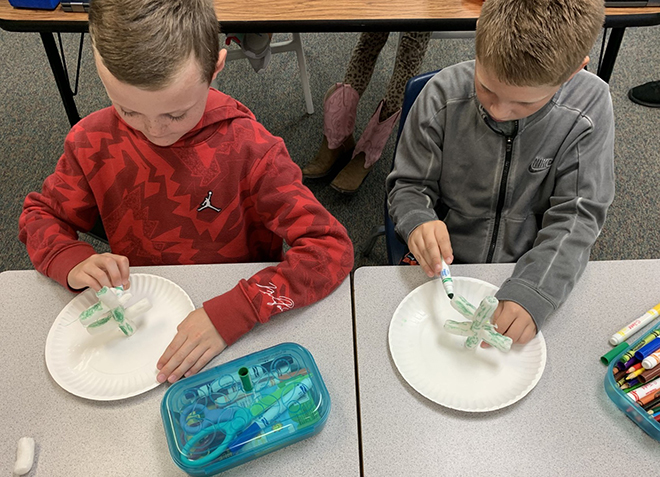Program brings agriculture to students; ‘Agriculture in the Classroom’ part of Illinois Farm Bureau

PHOTOS COURTESY OF DIANE CLELAND Belvidere Republican
The Illinois Agriculture in the Classroom initiative has programs throughout the state, including one covering Winnebago and Boone counties. The program helps students ages pre-K through fifth grade learn about where their food and fibers come from. Pictured here, two third-grade boys are learning about the different uses for field corn in a program called “Crazy for Corn.” They are shown building a corn stalk from bio-degradable packing peanuts made from corn.
Across the state of Illinois, the Bloomington-based Illinois Farm Bureau (IFB) and the IAA Foundation together are reaching over 600,000 students and 40,000 teachers each year, providing schools with agriculture-based resources and lesson plans for local schools to choose from.
Under the umbrella of the IFB, the educational program is called Agriculture in the Classroom (AITC)—which has a program in Winnebago and Boone counties. It reaches out to children ages pre-kindergarten through fifth grade, according to Diane Cleland, agriculture literacy coordinator for the two-county program.
The purpose of the program, she explained, is to help young students “understand how their food and fibers are produced.”
Specifically regarding Boone County, she mentioned that agriculture, or “ag” for short, is a “major economy,” in part because “Farmers produce a lot of grain and other commodities,” such as dairy and meat products.
Cleland further noted that when the farmers purchase feed and other supplies locally, “That all feeds dollars back into the local economy.”
However, she said, she and five other ag educators have observed that in the classrooms, many of the students “are four or five generations removed from farming,” and therefore may be unaware of how food and fibers get from farm to table.
“Very, very few kids actually live on a farm anymore,” Cleland added.
The coordinator herself grew up on a dairy farm, married a hog farmer and earned a degree in Foods in Business, along with a minor in Music.
She related that before coming to Agriculture in the Classroom 10 years ago, she worked in the food industry and also taught music, adding with a chuckle, “I kind of put the two jobs together.”
The state farm bureau and state AITC “have a bunch of different resources to use,” the coordinator outlined, and in Winnebago and Boone counties, “We try to use them [topics] more seasonally,” such as talking about apples in September, pumpkins in October, Thanksgiving food-related topics in November, etc.
The programs are tailored toward each age group, Cleland continued, such as developing vocabulary words with the youngest students to formulating math activities by second grade.
Topics may even differ by geographical area, based on the agricultural region, according to the coordinator. She used Peoria as an example, where a lot of horseradish is grown.
“We’ve been working with a lot of these schools for years,” Cleland commented proudly, adding that the curricula meet Common Core standards for learning by grade level, as well as meeting Next Generation Science Standards.
One of the things she has observed in the classroom is that some of the younger students are “separated from the real world,” in that they “have no connection where their food comes from,” and she surmised that shopping habits have changed.
“I think COVID-19 had a lot to do with it,” Cleland speculated.
So, when she goes into a classroom and talks to the students about where food comes from, the reaction from students she described is, “I think it’s kind of like when you see the light bulb go on.”
“Especially if they’re [in] third or fourth grade,” the coordinator added.
For educators, the state AITC is offering a chance to apply for a book grant of up to $250, covering categories of soil, life on the farm, celebrating diverse foods and families, graphic novels and chapter books.
Educators can apply for a project grant of up to $300 to design a project that integrates agriculture into one of their curriculum areas.
The deadline for applications is Friday, Oct. 20, and information is available at www.agintheclassroom.org.
Educators from Winnebago and Boone counties can also call Cleland’s office at 815-962-0653 for more information, or for more information about Agriculture in the Classroom.
Cleland summed up the importance of educating children early on about where their food comes from, because “They’re going to be our future consumers.”



